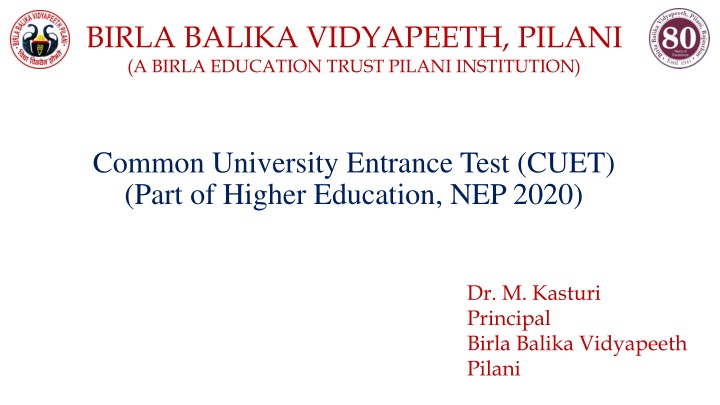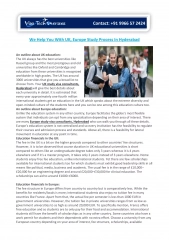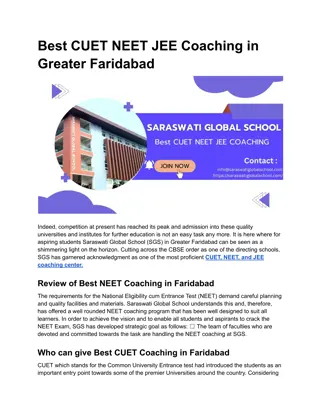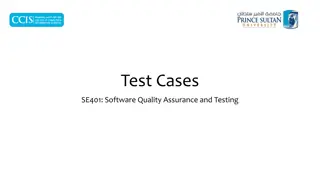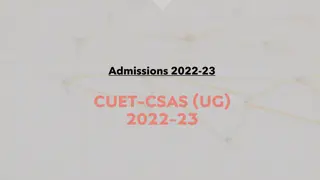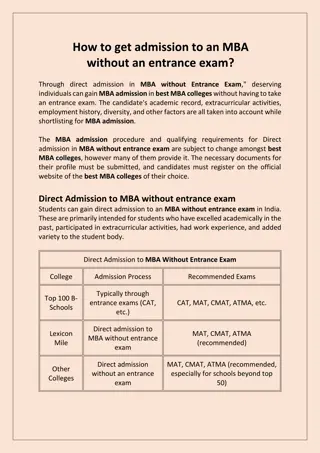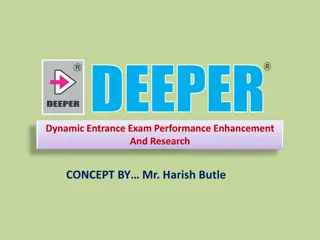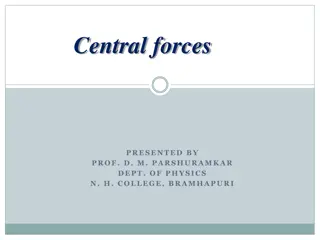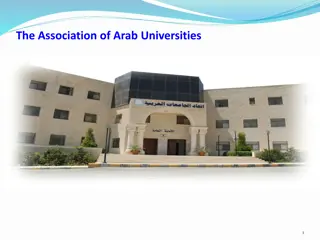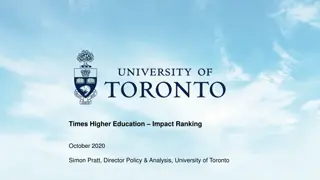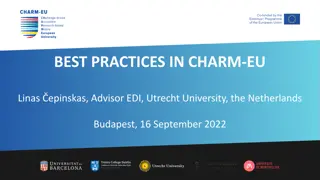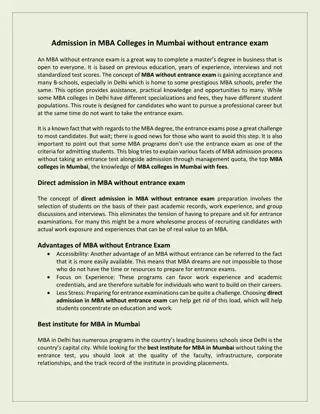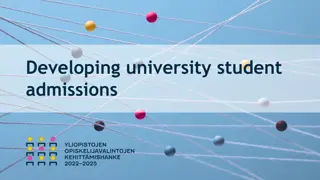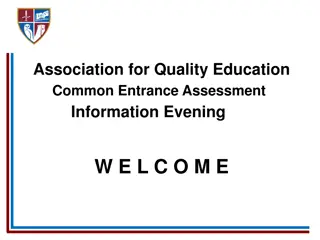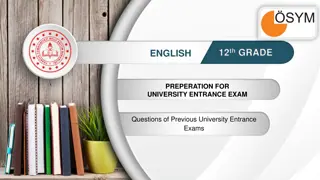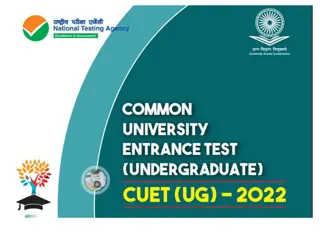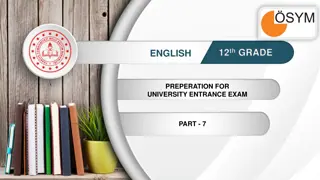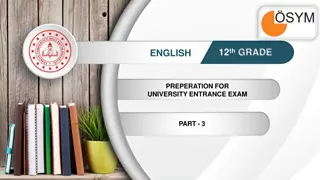All About CUET (Common University Entrance Test) for Central Universities
CUET is an undergraduate entrance test conducted by the National Testing Agency for Central Universities in India. It offers a single-window opportunity for aspiring students to gain admission in various participating organizations. The exam structure includes sections on languages, domain-specific subjects, and a general test, providing a comprehensive evaluation platform for candidates. To know more about the programs offered and examination details, visit the official CUET website.
Download Presentation

Please find below an Image/Link to download the presentation.
The content on the website is provided AS IS for your information and personal use only. It may not be sold, licensed, or shared on other websites without obtaining consent from the author.If you encounter any issues during the download, it is possible that the publisher has removed the file from their server.
You are allowed to download the files provided on this website for personal or commercial use, subject to the condition that they are used lawfully. All files are the property of their respective owners.
The content on the website is provided AS IS for your information and personal use only. It may not be sold, licensed, or shared on other websites without obtaining consent from the author.
E N D
Presentation Transcript
BIRLA BALIKA VIDYAPEETH, PILANI (A BIRLA EDUCATION TRUST PILANI INSTITUTION) Common University Entrance Test (CUET) (Part of Higher Education, NEP 2020) Dr. M. Kasturi Principal Birla Balika Vidyapeeth Pilani
What is CUET? Undergraduate entrance tests for all the Central Universities (CUs) A single window opportunity for students seeking admission in any of the Central Universities (CUs) across the country or other participating organizations (including State Universities, Deemed and Private Universities) across the Country.
Who will conduct? National Testing Agency (NTA) is An Autonomous Organization Under the Department of Higher Ministry of Education, Government of India . Education,
How will CUET (UG) - 2023 be conducted? Computer Based Test (CBT) Mode
Where can you get the details of the Programmes offered by Central Universities? https://cuet.samarth.ac.in/
Examination Structure for CUET (UG) - 2023 For CUET (UG) 2023, the following is the scheme of examination: Questions to be Attempted 40 questions to be attempted out of 50 in each language Section Subjects/ Tests Section 1A - Languages Section 1B - Languages Section 2 Domain Specific Subject There are 13 different languages. Any of these languages may be chosen. There are 20 Languages. Any of these languages may be chosen. There are 27 Domain specific subjects being offered under this section. A candidate may choose any subject as desired by the applicable University/ Organization. For any such undergraduate programme / programmes being offered by Universities where a General Test is being used for admission. 35/40 Questions to be attempted out of 45/50 Section 3 - General Test 50 Questions to be attempted out of 60
From the total subjects / languages, the candidate can choose maximum of 10 subjects from all three Section as given in tables below. Subject Code Name Section 1A 101 English 102 Hindi 103 Assamese 104 Bengali 105 Gujarati 106 Kannada 107 Malayalam 108 Marathi Subject LANGAUGE SUBJECTS 109 Odia 110 Punjabi 111 Tamil 112 113 Telugu Urdu
LANGAUGE SUBJECTS Section 1B Arabic Bodo Chinese Dogri French German Italian Japanese Kashmiri Konkani Maithili 212 Manipuri 201 202 203 204 205 206 207 208 209 210 211 213 Nepali 214 Persian 215 Russian 216 217 218 Santhali Sindhi Spanish 219 Tibetan 220 Sanskrit*
DOMAIN SUBJECTS Subject Name Subject Code Section 2 301 302 303 304 305 306 307 308 309 310 311 312 Accountancy/Book Keeping Agriculture Anthropology Biology/Biological Studies/Biotechnology /Biochemistry Business Studies Chemistry Environmental Studies Computer Science / Informatics Practices Economics/Business Economics Engineering Graphics Entrepreneurship Fine Arts / Visual Arts/(Sculpture/Painting)/ Commercial Art 313 Geography/ Geology
DOMAIN SUBJECTS 314 History 315 316 317 318 319 320 321 322 323 324 325 326 327 Home Science Knowledge Tradition Practices India Legal Studies Mass Media/Mass Communication Mathematics / Applied Mathematics Performing Arts Physical Education/National Cadet Corps (NCC)/ Yoga Physics Political Science Psychology Sanskrit* Sociology Teaching Aptitude
DOMAIN SUBJECTS Section 3 501 General Test Candidates will be tested on the following topics in the CUET General Test- General Knowledge, Current Affairs, General Mental Ability, Numerical Reasoning, and Logical Reasoning. Ability, Quantitative Analytical &
Important Instructions Application through the Online mode only on the website https://cuet.samarth.ac.in/ Only one application is to be submitted by a candidate. Enter only candidate s / parents e-mail address and Mobile Number
Paradigm Shift in Education 1.Rote Learning to Competency Based Teaching and Learning 2.Inter-Disciplinary and Multi-Disciplinary approach 3.High Quality Control and Pedagogy 4.Vertical and Horizontal Mapping
Paradigm Shift in Education 5. 4 Cs of 21st Century Skills Critical Thinking, Creative, Collaborative and Communication Skills 6. Toy Pedagogy 7. Art Integration 8. Project Based Learning
Paradigm Shift in Education 9. Student Centric Teaching Learning Process 10. Skill Based Education 11. Experiential Learning- Approach Based, Research Based and Case Study 12. Emotional Intelligence
Paradigm Shift in Education 13. Innovative Practices 14. Learning by Doing 15. Holistic and Vocational Education 16. ICT Enabled Teaching Learning 17. Teacher as a Facilitator
Capacity Building Programmes for Teachers 1. 50 Hours Mandatory Training Programmes 2. Mandatory Courses by Diksha, Swayam and Nishtha Portal 3. In-House Faculty Development Programmes 4. CBSE and other training institutes trainings 5. In-Service Professional Development
